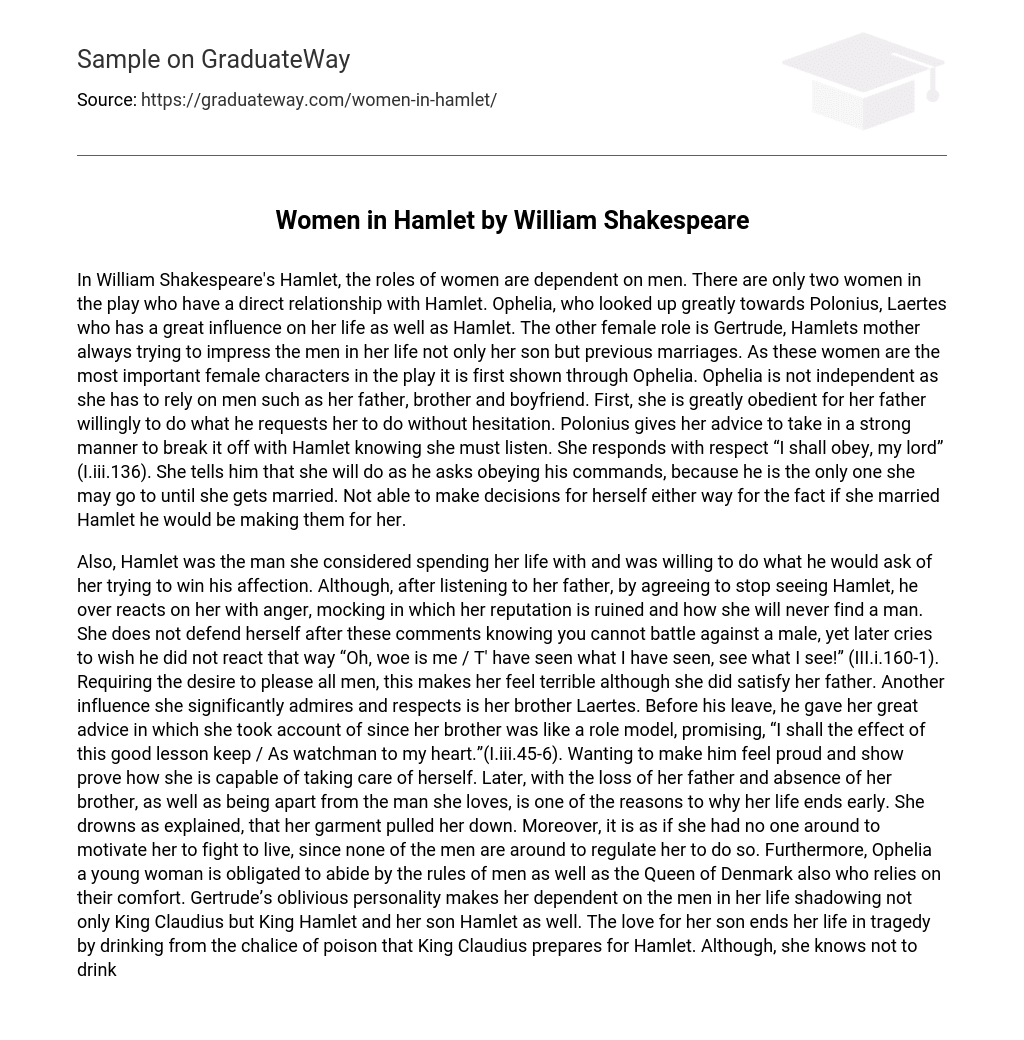In William Shakespeare’s Hamlet, the roles of women are dependent on men. There are only two women in the play who have a direct relationship with Hamlet. Ophelia, who looked up greatly towards Polonius, Laertes who has a great influence on her life as well as Hamlet. The other female role is Gertrude, Hamlets mother always trying to impress the men in her life not only her son but previous marriages. As these women are the most important female characters in the play it is first shown through Ophelia. Ophelia is not independent as she has to rely on men such as her father, brother and boyfriend. First, she is greatly obedient for her father willingly to do what he requests her to do without hesitation. Polonius gives her advice to take in a strong manner to break it off with Hamlet knowing she must listen. She responds with respect “I shall obey, my lord” (I.iii.136). She tells him that she will do as he asks obeying his commands, because he is the only one she may go to until she gets married. Not able to make decisions for herself either way for the fact if she married Hamlet he would be making them for her.
Also, Hamlet was the man she considered spending her life with and was willing to do what he would ask of her trying to win his affection. Although, after listening to her father, by agreeing to stop seeing Hamlet, he over reacts on her with anger, mocking in which her reputation is ruined and how she will never find a man. She does not defend herself after these comments knowing you cannot battle against a male, yet later cries to wish he did not react that way “Oh, woe is me / T’ have seen what I have seen, see what I see!” (III.i.160-1). Requiring the desire to please all men, this makes her feel terrible although she did satisfy her father. Another influence she significantly admires and respects is her brother Laertes. Before his leave, he gave her great advice in which she took account of since her brother was like a role model, promising, “I shall the effect of this good lesson keep / As watchman to my heart.”(I.iii.45-6). Wanting to make him feel proud and show prove how she is capable of taking care of herself. Later, with the loss of her father and absence of her brother, as well as being apart from the man she loves, is one of the reasons to why her life ends early. She drowns as explained, that her garment pulled her down. Moreover, it is as if she had no one around to motivate her to fight to live, since none of the men are around to regulate her to do so. Furthermore, Ophelia a young woman is obligated to abide by the rules of men as well as the Queen of Denmark also who relies on their comfort. Gertrude’s oblivious personality makes her dependent on the men in her life shadowing not only King Claudius but King Hamlet and her son Hamlet as well. The love for her son ends her life in tragedy by drinking from the chalice of poison that King Claudius prepares for Hamlet. Although, she knows not to drink the chalice as the King warns her not to, nevertheless, does it anyways symbolize as a sacrificing mother. Before her death the last she says, “No, no, the drink, the drink! O my dear Hamlet! / The drink, the drink! I am poisin’d” (V.ii.303-4).
This depicts what happens if women are disobedient as she was to her husband which led to her death and also portraying how saving Hamlets life was what she had to do being selfless and caring. In addition, Gertrudes need for attention is seen after her quick marriage following the death of King Hamlet. Losing the feeling of importance, where she needs, and rapidly gets over her husband’s death moving on explaining to hamlet, “Do not for ever with thy vailed lids / Seek for thy noble father in the dust” (I.ii.70-1). Revealing how her values of affection are far greater than her moral righteousness and respect of herself not considering others approach on situations. Marrying King Claudius, she is highly dependent on him, who is able to persuade her in fictitious ideas others might not allow themselves to believe yet Gertrude constantly does. Such as after, he hears of the death of Polonius, tries to make it sound like he is helping Hamlet with his best interests when in reality he plans to kill him. As he assures the Queen, “It had been so with us, had we been there / His liberty is full of threats to all” (IV.i.13-4), the king attempt to secure his own safety first sending Hamlet off somewhere far by seeming like it is for a greater intrest. Gertrude is oblivious to her surroundings which present it easier for the King to manipulate in addition for her disregard for her own place and her ultimate confusion. Gertrude is a strong character by her title as being the Queen, nevertheless forced to obey and concur with reinstated ideas by the King, losing attention from King Hamlet and sacrificing herself for Hamlet.
The woman of Shakespeare’s play Hamlet needs guidance in order to achieve fulfillment. Ophelia, seen loyal and obedient to her father Polonius, brother Laertes and listening to other males such as Hamlet recognized throughout the play, displays her devotion to make them pleased. Finally, Gertrude has a high power considering all the women and even men, still fights the struggle between impressing men in order to achieve satisfaction. They both play the passive roles in the play; this shows that all women were not measured as equals.





